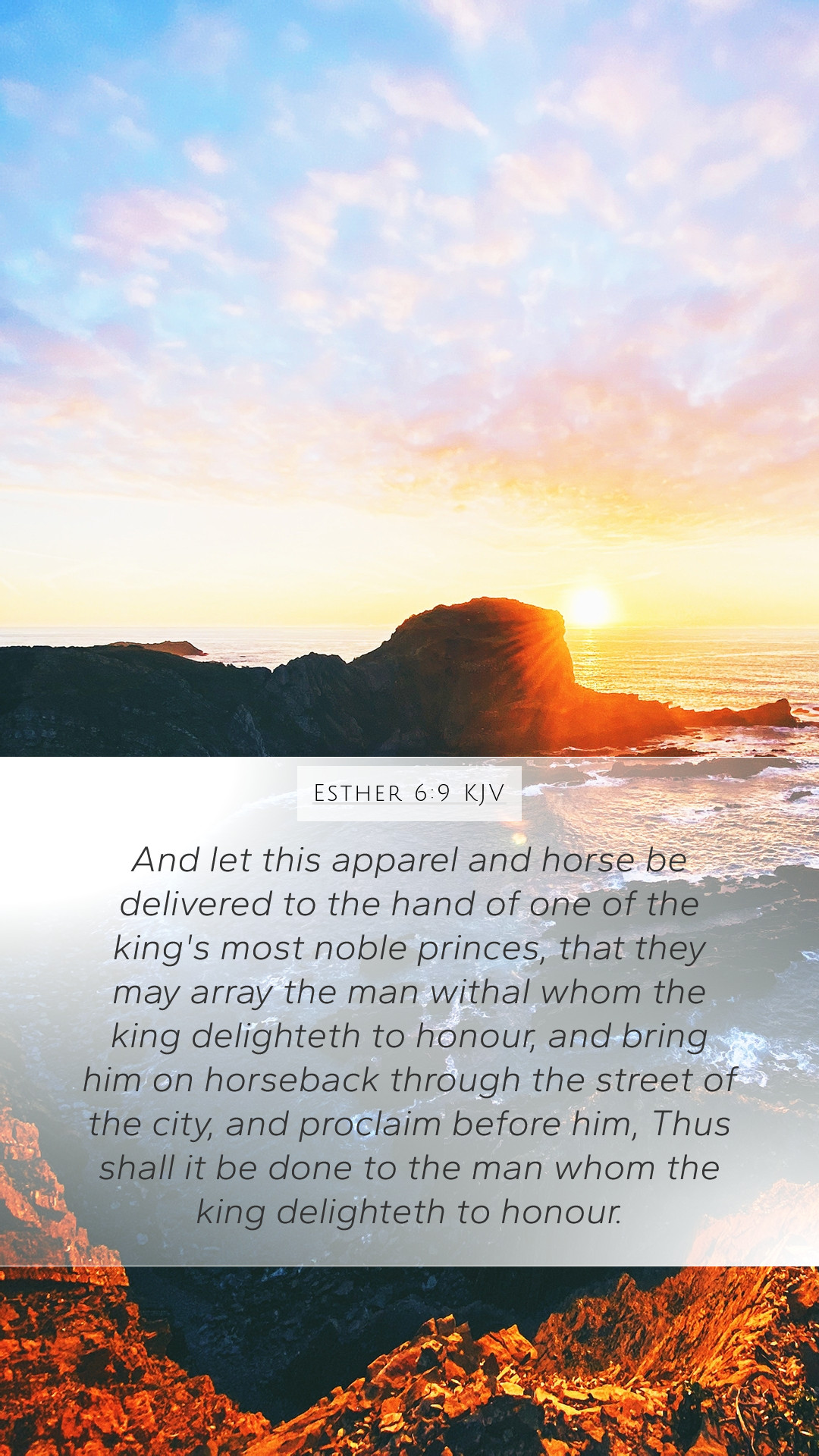Old Testament
Genesis Exodus Leviticus Numbers Deuteronomy Joshua Judges Ruth 1 Samuel 2 Samuel 1 Kings 2 Kings 1 Chronicles 2 Chronicles Ezra Nehemiah Esther Job Psalms Proverbs Ecclesiastes Song of Solomon Isaiah Jeremiah Lamentations Ezekiel Daniel Hosea Joel Amos Obadiah Jonah Micah Nahum Habakkuk Zephaniah Haggai Zechariah MalachiEsther 6:9 Meaning
What is the meaning of Esther 6:9?
And let this apparel and horse be delivered to the hand of one of the king's most noble princes, that they may array the man withal whom the king delighteth to honour, and bring him on horseback through the street of the city, and proclaim before him, Thus shall it be done to the man whom the king delighteth to honour.
Esther 6:9 Bible Verse Meaning
Understanding Esther 6:9
Esther 6:9 is a significant verse that unfolds a moment of divine intervention in the story of Esther, revealing profound lessons about God's sovereignty and justice. This analysis combines insights from notable public domain commentaries to provide a comprehensive understanding of the verse.
Verse Text
"And let this apparel and horse be delivered to the hand of one of the king's most noble princes, that they may array the man withal whom the king delighteth to honor, and bring him on horseback through the street of the city, and proclaim before him, Thus shall it be done unto the man whom the king delighteth to honor." (Esther 6:9, KJV)
Verse Meaning
This verse occurs at a pivotal moment in the Book of Esther, where Haman, the antagonist, is unwittingly tasked with honoring Mordecai, the Jew. The request for royal apparel and a horse symbolizes high honor and respect. Below are interpretations from renowned commentaries:
-
Matthew Henry:
Henry emphasizes that this verse illustrates the unexpected ways in which God honors His faithful servants. Mordecai’s righteous actions during an earlier plot against the king went unrecognized until this moment, showcasing God’s timing in bestowing honor.
-
Albert Barnes:
Barnes highlights the irony in Haman being the one to carry out this honor, which serves as a divine reversal of fortune. He notes that this act serves as a public declaration, reinforcing the idea that those who pride themselves in power may find themselves humbled.
-
Adam Clarke:
Clarke discusses the significance of the "noble princes" involvement, suggesting that the undertaking of such a task was prestigious. He relates this to the expectation of humility before God, signifying that true honor comes from divine approval rather than human effort.
Key Themes
-
Divine Justice:
The honor bestowed upon Mordecai, juxtaposed with Haman's intentions, illustrates God's ultimate justice. It serves as a reminder that those who oppose God's people will face consequences.
-
The Role of Humility:
This verse reflects the importance of humility. Haman, who sought power and recognition, is led to honor someone he despised, highlighting that true greatness comes from serving others.
-
Unexpected Turn of Events:
The sudden reversal of Haman's fortune underscores the theme that God can change circumstances swiftly, often contrary to human expectations. It prompts readers to trust in God's plans, even in difficult times.
Cross References
- Proverbs 16:18: "Pride goes before destruction, and a haughty spirit before a fall." - This verse complements the themes of pride and humility found in Esther 6:9.
- Galatians 6:7: "Do not be deceived: God is not mocked, for whatever one sows, that will he also reap." - Relevant to the justice served towards Haman.
- Psalm 75:7: "But it is God who executes judgment, putting down one and lifting up another." - A clear reflection of the divine hand in elevating and humbling individuals.
Application in Daily Life
The insights from Esther 6:9 encourage readers to reflect on their actions and motives. It serves as a reminder that:
- God is aware of our deeds and will honor those who are faithful.
- True power lies in humility and service to others.
- The outcomes of our lives may not always align with our expectations, and we must trust in God's timing.
Conclusion
Esther 6:9 presents a compelling picture of God's providence and justice. By studying this verse through the lenses of Matthew Henry, Albert Barnes, and Adam Clarke, readers can gain a deeper understanding of its implications and application. This verse not only inspires reflections on personal faithfulness but also highlights the importance of relinquishing pride in favor of humility.
Further Study
For those engaging in Bible study, this verse serves as a focal point for discussions on God's sovereignty, the consequences of pride, and the nature of divine justice. It is recommended to incorporate it into Bible study groups or online Bible study courses that explore similar themes in scripture.


